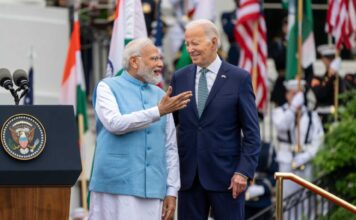G-7 nations “will stand with Ukraine for as long as it takes”
India, Brazil, Comoros, Indonesia, South Korea and Singapore are also invited
U.S. debt ceiling and a potential default looming large over global economy
Niigata, Japan: Financial leaders of the Group of Seven advanced economies are discussing ways to support Ukraine and pressure Russia to end the war as they meet in Japan starting Thursday.
U.S. Treasury Secretary Janet Yellen said the G-7 nations “will stand with Ukraine for as long as it takes” to end the conflict. Ukraine’s finance minister, Serhiy Marchenko, was participating online in the first session of the G-7 talks in Niigata, a port city on the Japan Sea coast.
“We have taken a wave of actions in the past few months to crack down on evasion. And my team has traveled around the world to intensify this work,” Yellen said.
The leaders will be mulling ways to prevent Russia and other countries from circumventing sanctions against Moscow for its invasion, Japanese Finance Minister Shunichi Suzuki told reporters.
The war and its toll on the global economy, debt crises in developing countries and a stalemate in Washington over the national debt are topping the agenda of the three days of talks by finance ministers and central bank governors of G-7 countries and others invited to attend.
Despite the wide range of topics due for consideration, from climate change to debt relief to digital currencies, the standoff over the U.S. debt ceiling and a potential default loomed as a major potential threat to the global economy.
Speaking before the closed-door meetings began, Yellen said one of her priorities was to emphasize the
importance of resolving the crisis. “A default is frankly unthinkable,” she told reporters. “America should never default. It would rank as a catastrophe.”
Yellen also will be seeking to reassure her counterparts over recent bank failures that have raised worries over risks for the global financial system.
The Federal Reserve said in a report this week that U.S. banks raised their lending standards for business and consumer loans in the aftermath of three large bank failures that were in part brought on by the central bank’s sharp increases in interest rates to beat down inflation that surged to four-decade highs after the pandemic.
Inflation has remained stubbornly high. Consumer prices in the United States rose 0.4% in April, up sharply from a 0.1% rise from February to March, and measures of underlying inflation stayed high, a sign that further declines in inflation are likely to be slow and bumpy even though the annual increase of 4.9% was the smallest in two years.
Other G-7 economies are contending with even higher surging prices, obliging their central banks to raise interest rates that went to record lows in the early days of the pandemic.













